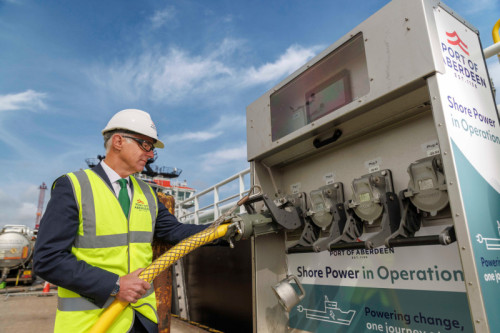
Manchester Uni Spurs Major Scottish Maritime Green Shift
A significant new milestone in green energy has been achieved in Scotland, underpinned by research from the Tyndall Centre for Climate Change Research at The University of Manchester.
Port of Aberdeen has officially launched its new shore power system-Scotland’s largest maritime decarbonisation initiative to date-which allows ships to switch off their fossil fuel engines while docked and connect instead to clean, low-carbon shore power. This transition significantly reduces greenhouse gas emissions, improves air quality, and lowers noise levels in Aberdeen’s busy harbour.
Now live across five berths in North Harbour-with additional capacity to expand-the installation is expected to reduce up to 60,000 tonnes of CO₂ equivalent over the next 20 years. This saving is equivalent to removing approximately 2,140 cars from the road each year. New Tyndall research also sets out how UK Government policy changes could support faster deployment of shore power at other ports.
The success of the project not only helps Aberdeen advance its ambition to become the UK’s first net zero port by 2040 but also demonstrates the crucial role university research plays in real-world climate solutions. Dr Bullock and the Tyndall team’s sustained involvement from early research to full deployment highlights the lasting value of academic contributions to national decarbonisation efforts.
The project, known as Shore Power in Operation, is part of the UK Department for Transport’s Zero Emission Vessels and Infrastructure (ZEVI) competition, delivered through UK SHORE and Innovate UK. With £4 million in funding and extensive collaboration between industry and academia, it represents a landmark public-private investment in cleaner port infrastructure.
Port of Aberdeen led the initiative in partnership with a broad consortium including OSM Offshore, Tidewater Marine UK Ltd, Connected Places Catapult, and researchers from the Tyndall Centre based in the University of Manchester, with support from Buro Happold and Energy Systems Catapult. PowerCon, a global leader in shore power solutions, delivered the on-site infrastructure.
https://www.manchester.ac.uk/about/news/university-research-leads-to-scotlands-largest-maritime-decarbonisation-project/


